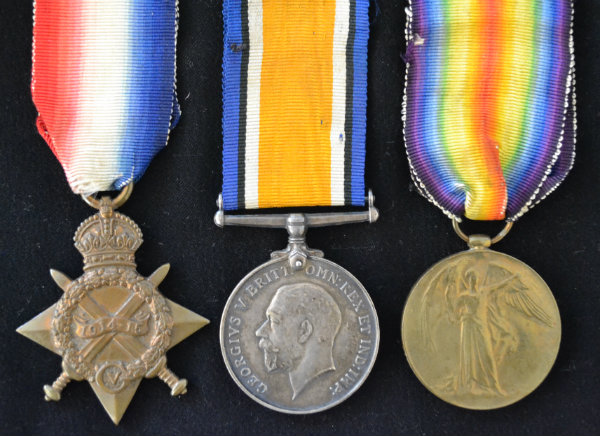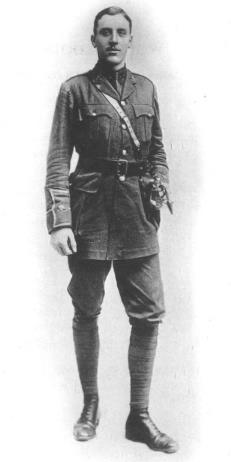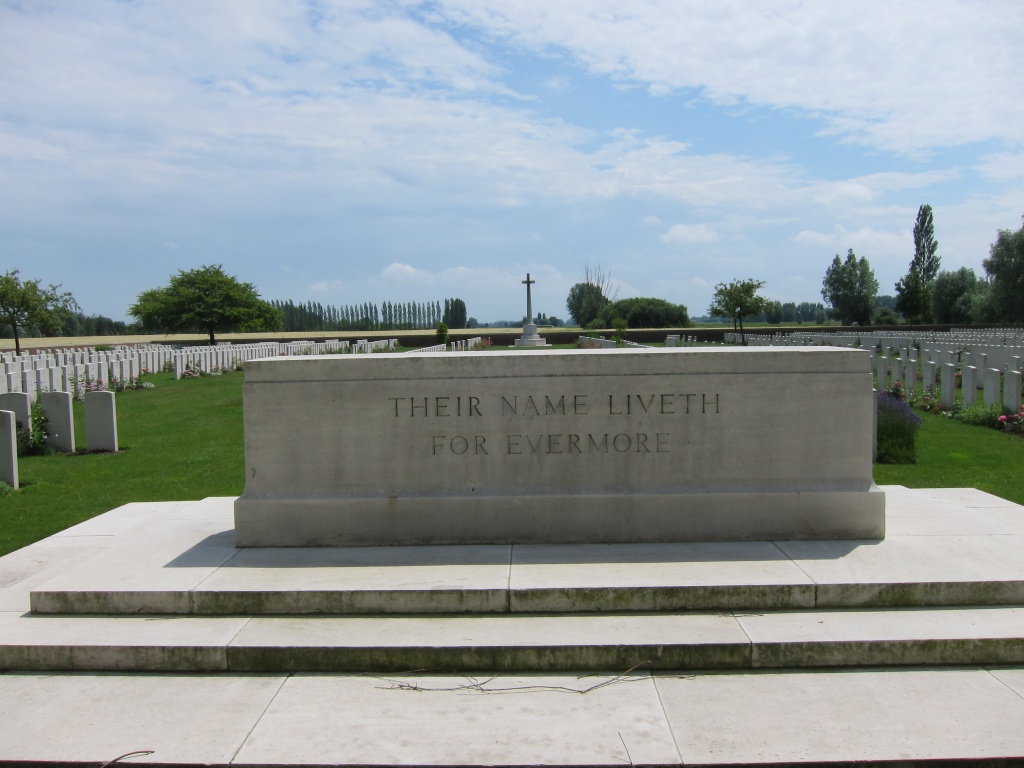Personal Details
Douglas Kirk Wolley Dod was born in Simla, Bengal, India on 18 November 1896 (baptised 2nd February 1897), the third son of Francis and Annette Mary Wolley Dod of Edge Hall, Malpas, Cheshire.
Douglas attended Rugby School and is commemorated on the war memorial. He is also commemorated on the memorial at The Abbey Church of St Mary, Nuneaton.
Military Details
Regiment : 12th Battalion The King’s (Liverpool Regiment)
Rank : Lieutenant
Service Number :
Killed in action; France 25 September 1915 Aged 18

The 1914 Star (also known as 'Pip') was authorised under Special Army Order no. 350 in November 1917 and by an Admiralty Fleet Order in 1918, for award to officers and men of the British and Indian Expeditionary Forces who served in France or Belgium between 5 August and midnight of 22–23 November 1914. The former date is the day after Britain's declaration of war against the Central Powers, and the closing date marks the end of the First Battle of Ypres.
The 1914–15 Star (also known as 'Pip') was instituted in December 1918 and was awarded to officers and men of British and Imperial forces who served against the Central European Powers in any theatre of the Great War between 5 August 1914 and 31 December 1915. The period of eligibility was prior to the introduction of the Military Service Act 1916, which instituted conscription in Britain.
The British War Medal (also known as 'Squeak') was a silver or bronze medal awarded to officers and men of the British and Imperial Forces who either entered a theatre of war or entered service overseas between 5th August 1914 and 11th November 1918 inclusive. This was later extended to services in Russia, Siberia and some other areas in 1919 and 1920. Approximately 6.5 million British War Medals were issued. Approximately 6.4 million of these were the silver versions of this medal. Around 110,000 of a bronze version were issued mainly to Chinese, Maltese and Indian Labour Corps. The front (obv or obverse) of the medal depicts the head of George V. The recipient's service number, rank, name and unit was impressed on the rim.
The Allied Victory Medal (also known as 'Wilfred') was issued by each of the allies. It was decided that each of the allies should each issue their own bronze victory medal with a similar design, similar equivalent wording and identical ribbon. The British medal was designed by W. McMillan. The front depicts a winged classical figure representing victory. Approximately 5.7 million victory medals were issued. Interestingly, eligibility for this medal was more restrictive and not everyone who received the British War Medal ('Squeak') also received the Victory Medal ('Wilfred'). However, in general, all recipients of 'Wilfred' also received 'Squeak' and all recipients of The 1914 Star or The 1914/1915 Star (also known as 'Pip') also received both 'Squeak' and 'Wilfred'. The recipient's service number, rank, name and unit was impressed on the rim.
Further Information
Report in the Chester Chronicle 2nd October 1915 regarding the death of Douglas Kirk Wolley Dod
"MALPAS OFFICER KILLED
News has been received at Edge Hall that Lieut. Douglas Kirk Wolley-Dod, 120th Battalion of the King's Liverpool Regiment, is reported killed by a shell in the trenches in Flanders on September 25th. Lieut. Wolley-Dod was a promising young officer of 18 years of age. He stood 6 feet 3 inches high, and had adopted the army as a profession, receiving his commission in September, 1914, from the Officers' Training Corps in connection with Rugby School, where he was educated. His promotion dated from January of this year, and he was drafted to the front exactly two months ago. It is stated that his death was caused by the displacement of some masonry during the fighting of last week, caused by the bursting of an enemy shell. On the local roll of honour, which has been compiled by the Rector of Malpas, appear the following names, members of the family who are serving the country. "O. C. Wolley-Dod, C.B., D. S. O., Brigadier General Commanding 86th Brigade. Douglas K. Wolley-Dod, King's Liverpool Regiment. J. C. Wolley-Dod, R. G. A. C. F. Wolley-Dod, Sherwood Foresters." The Dod family have been connected with Malpas from a very early period and throughout the centuries have been identified with all that was best for the country and the people amongst whom they have lived. On all hands there are heard expressions of sympathy for the family in their bereavement, but the knowledge that to the fullest possible extent they are taking their part in this world war should tend to ease the poignancy of their grief."
Chester Chronicle 2nd October 1915
Report in the Liverpool Echo 2nd October 1915 regarding the death of Douglas Kirk Wolley Dod
"It has been officially reported that Lieutenant Douglas Kirk Wolley-Dod, 12th King's (Liverpool Regiment), youngest son of Mr. F. Wolley-Dod of Edge Hall, Malpas, has been killed in the trenches in Flanders. Only eighteen years of age, he stood 6 ft. 3 in. high, and possessed all the fighting spirit of his forebears. He obtained his commission in September, 1914, from the Officers' Training Corps in connection with Rugby School, where he was educated, and was promoted in January of this year. He had been at the front exactly two months. Two of his brothers hold commissions in the Army. Lieutenant J .C. Wolley-Dod, R. G.A. and Lieutenant C. F. Wolley-Dod, Sherwood Foresters, O. C. Wolley-Dod, C. B., D. S. O., being Brigadier-General Commanding the 86th Brigade, now at the Dardanelles. The family are one of the oldest in Cheshire, and are highly esteemed by all for their generosity and noble character. "
Liverpool Echo 2nd October 1915
Report in the Chester Chronicle 9th October 1915 regarding the death of Douglas Kirk Wolley Dod
"THE LATE LIEUT. D. K. WOLLEY-DOD
HOW HE FELL
Further particulars are now given of the fate of Lieutenant Douglas Kirk Wolley-Dod, King's (Liverpool Regiment) 12th Battalion, youngest son of Mr. and Mrs. Wolley-Dod,of Edge Hall, Cheshire, and nephew of Brigadier-General O. C. Wolley-Dod, C. B. , D. S. O. His Colonel writes of his cool and collected behaviour in trying circumstances, and says that he was setting a very fine example to his men during a heavy bombardment in the trenches, where he was killed instantaneously by a shell. His Colonel adds: "Not only was he a hard-working, keen, reliable officer, happy and cheerful under all circumstances, but his bright disposition had endeared him to all ranks, and he was a great favourite.""
Chester Chronicle 9th October 1915
Report on the death of Douglas Kirk Wolley Dod in De Ruvigny’s Roll of Honour 1914 – 1919
“WOLLEY-DOD, DOUGLAS KIRK, Lieut., 12th (Service) Battn. The King’s (Liverpool Regt.), yst. s. of Francis Wolley-Dod of Edge Hall, Malpas, Cheshire, late of the Indian Public Works Dept., by his wife, Annette Mary, dau. of the late Frederic Fuhrmann Clarke; and nephew of Brigadier-General D. C. Wolley-Dod; b. Simla, India, 18 Nov. 1896; educ. the Rev. H. E. Mocatta’s Preparatory School, Clive House, Old Colwyn, and School House, Rugby; volunteered and applied for a commission on the outbreak of war; was gazetted 2nd Lieut. to the 12th King’s 17 Sept. 1914, and promoted Lieut. 3 Feb. 1915; left for France with his battalion 25 July, and was killed at the commencement of the battle of Loos 25 Sept. 1915, somewhere in the salient near Armentieres. Buried at Rue Pentillon, near Laventie.
His Commanding Officer, Colonel L. Nicholson wrote:
“He was killed by a shell while in the trenches with his platoon, and they were being very heavily bombarded, and he was setting a very fine example to his men by by his cool and collected behaviour in trying circumstances. He was killed instantaneously. Not only was your son a very hard-working, keen, reliable officer, happy and cheerful under all circumstances, but his bright disposition had endeared him to all ranks, and he was a great favourite.”Lieut.-Col. C. D. Fowler, commanding 7th K. O. Y. L. I.:
“I commanded his company from Oct. 1914 to May, 1915, all of which time he was one of my subalterns. I can’t tell you how awfully sorry I was to hear of his being killed during the bombardment; he was the life and soul of our company during our training, and all his influence was for good. He was so cheery and jolly, and his spirits never seemed to get damped. He was the true type of what I am insular enough to think is the best in the world, a young English gentleman, and that your son was in the truest sense.”The Adjutant (E. H. Pearson, since killed accidentally in France):
“He was the life and soul of the regiment, and he was beloved by all of us, and the regiment, I feel, will never be the same without him. He was killed instantaneously by a shell which hit the parapet and crushed him, and he was laid to rest in a little cemetery about one mile from the firing line, and about two miles from Laventie. As we shall probably be in the neighbourhood for two or three weeks, I shall try and get some box trees to put round his grave.””
De Ruvigny’s Roll of Honour 1914 – 1918
Effects £154 11s. 2d.
Taken from Forces War Records
If you can provide any further information on Douglas Kirk Wolley Dod please get in touch by leaving a comment below, using our Contact Form or by calling in to Whitchurch Heritage Centre.
Information provided by Whitchurch Museum and Archives


